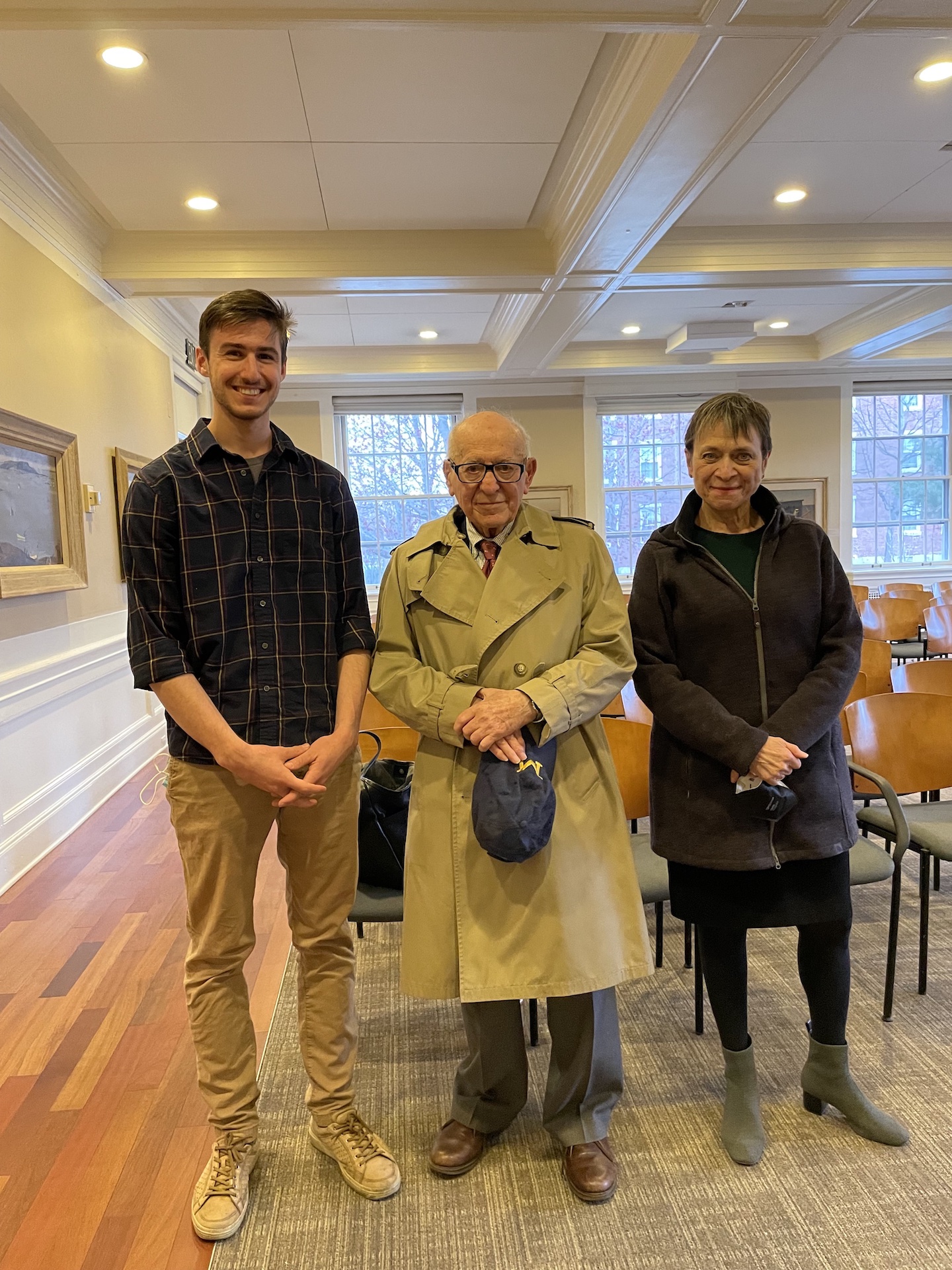Horowitz speaks on experience in Holocaust
May 5, 2022
 Courtesy of Gabe Gitter-Dentz
Courtesy of Gabe Gitter-DentzTo mark Holocaust Remembrance Day, Bowdoin Hillel and the Departments of English and History co-hosted a lecture and discussion with Holocaust survivor Rudolph “Rudy” Horowitz on Thursday, April 28 in Lancaster Lounge.
During his lecture, Horowitz, 93, discussed his memoir, “Avoiding the Cracks,” which details his story of survival during World War II and his life after the Holocaust. While writing the book, a friend of his suggested that Horowitz treat the book as a series of letters to his future grandchildren.
“I’m sure you’re familiar, as kids, you always try not to step on cracks,” he said. “I used to tell myself walking home or running home: ‘If I avoid stepping on the cracks, [I’ll] survive the war.”
Horowitz was introduced by Harrison King McCann Professor of English Marilyn Reizbaum. She noted that she became aware of Horowitz’s story after Aadhya Ramineni ’23 wrote about him in her October 15 column for the Orient titled “What Matters in the End?”
A resident of The Highlands retirement community, Horowitz spoke about his childhood in Poland during the Nazi invasion.
“My father was activated because we all knew that Germany was going to attack and the excuse [Hitler] had for invading Poland was very similar to Putin [invading Ukraine],” Horowitz said.
He explained that the rhetoric in messaging from Adolf Hitler and Vladimir Putin had striking similarities, justifying invasion as the “liberation” of Poles and Ukrainians from violence.
Horowitz’s father obtained Chilean passports for his family to keep them from being sent to concentration camps by the Nazis. These passports indicated that the family was protected by the laws set by the Geneva Convention. Horowitz also discussed the importance of continuing his education while trying to evade capture.
“[My mother] hired a recent high school graduate to [help us] continue our studies and tutor us on a daily basis, progressing much faster than we would in an ordinary classroom. On top of that, she hired Mrs. Michaelis, who was an English-speaking woman, to teach us English,” Horowitz said.
Eventually, Horowitz was sent to a family camp in France. One particularly notable memory of his is watching French films in a small basement with his brother. Through these films, he learned how to speak French.
In September 1944, Horowitz was liberated with his family. After the Holocaust, the family immigrated to the United States, settling in New York. Horowitz eventually became an architect, receiving his Bachelors of Architecture in 1958 at the University of Michigan. He reflected on other survivors.
“I had a strange feeling because all of these people that have been to Auschwitz about the concentration, they had numbers on their forearms. I didn’t. And I just kept my sleeve down all the time. I didn’t realize in those days, but that was going through a survivor’s guilt. You know, I didn’t want to show that I somehow got away with it,” he said.
After Horowitz concluded his lecture, members of the audience asked him questions.
Lia Kornmehl ’23 asked if, when Horowitz was a teenager, he understood the scope of Hitler’s “Final Solution.”
“My mother, [because] we were small, tried to shield us as much as possible. But you couldn’t avoid knowing,” he explained. “We would wake up in the middle of the night because the Nazis would make the raids of time. And you’d hear the roar of the engines of the trucks and the screaming and yelling of the assessment. … I understood what it meant to get diarrhea from fright on an empty stomach.”
Horowitz responded to a question from Sarah Luehrmann ’23 about whether he sees himself as an educator following his experience.
Horowitz explained that he does not see himself as an educator and wrote his book as a series of letters to his future grandchildren so that they would know their grandfather and his story. He did, however, discuss the importance of education in perilous times such as our own and those of World War II.
“Education is so important, especially today,” Horowitz said. “The most important thing in education is to learn to be critical thinkers.”

Comments
Before submitting a comment, please review our comment policy. Some key points from the policy: